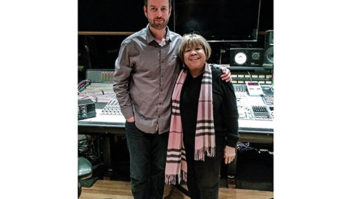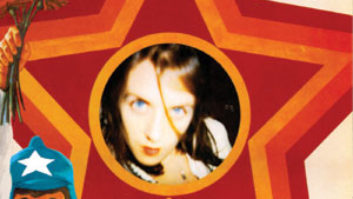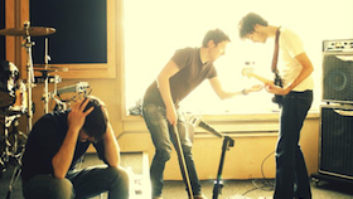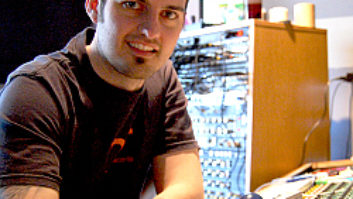
Brian Deck has been a leading light of the Chicago music scene for going on three decades now, one of those classic multi-hyphenates: musician-engineer-producer-studio owner, often all at the same time. As a musician, he has toured and recorded with such groups as Red Red Meat and Ugly Casanova, and also played on many of the albums he’s produced (mostly, but not exclusively, drums/percussion and keyboards). He and producer Brad Wood opened the popular Wicker Park (Chicago) studio Idful Music in the late ’80s, which hosted scads of mostly local indie bands. Then, Deck branched off and, with Red Red Meat and Califone percussionist Ben Massarella, started Clava Studios, where he worked with Modest Mouse and others. He was also a regular at Engine Studios up until it closed a couple of years ago.
His lengthy production/engineering credits include several albums with Iron & Wine (Sam Beam), Gomez, Califone, Secret Machines, John Cale, Langhorne Slim, The Shins, Ugly Casanova, Modest Mouse and Counting Crows. In fact, those last two, with whom he’s worked on multiple projects through the years, are recent repeat customers: “I spent about five months in Portland last year working with Modest Mouse at their studio, and I just finished a Counting Crows record where I spent two months in San Francisco [actually, Berkeley’s Fantasy Studios] and a couple of weeks in New York [mixing at the Magic Shop],” Deck says.
Growing up in the Chicago suburb of Crystal Lake, he aspired to play in rock bands in high school. “I graduated in ’82, but it seems as though the music culture in our high school was very ’60s-oriented; Doors and Zeppelin-centric,” Deck says from his Chicago home studio. “I was in a Hendrix cover band, but in college was in new wave bands.”
Deck attended Northern Illinois University, where he earned a degree in percussion performance. It was at NIU that he met Brad Wood (in the music program as a saxophonist), and the two first hatched schemes about working in recording, in part to support their playing. After interning and working at various downtown studios—including the top local jingle house, CRC—Deck, along with Wood and a third partner, Dan Sonis (who played with Deck in Lucky Mud), built Idful Music in 1989 and remained there until 1992, when the demands of playing music overwhelmed his studio life for a period.
“When I declared myself competent and started asking for people’s money to make their records, I had a lot of confidence in my own aesthetic, which was heavily influenced by the bands I was in and the bands I was listening to,” he says. “And all I was interested in doing at the time was becoming an extra member of the band while I was working on a project. I would play frequently, I would sing frequently, and that’s a young man’s approach to the job, and I know that alienated some people and some folks really liked it. I had some repeat clients back then, as well, but after a while you start to learn that if you want to continue to work in this field, you have to accommodate the people you’re working for, so I started to understand that I needed to listen more to their explanations of what their artistic inspirations were and put the emphasis on making that the important thing. That being said, I think I went a little too far in that direction for several years and kind of lost myself. I learned I have to find that balance. For me, to be happy doing this thing, I have to be in some way expressing my own aesthetic and instincts, as well.”
Does he think he has a “sound?” “I think everyone has a sound,” Deck says. “No one is so versatile that they can just do anything and not adhere fairly closely to what they know how to do. I don’t try to have a sound, but I’m absolutely sure that I have a sound and people come to me for what they think is my sound, and I think I’ve had different sounds over the years. For a while, people were attracted to the Red Red Meat sounds, and the Califone sound, and for the past few years people have been attracted to the Iron & Wine sound. That covers a lot of different sounds just within those.”
He says his production influences “are probably all the same people that everyone else says. I loved the classics—love The Beatles, love the Stones, love Led Zeppelin. But through the Red Red Meat period we also went through a long time being influenced by the Folkways recordings and field records of early American music, and also by what Tom Waits was doing at the time on records like Swordfish Trombones and Rain Dogs—using a lot of room ambience that gives a place instant context.”
He admits to missing Engine Studios, which drew many clients to him in Chicago for about a dozen years, but notes, “Since the demise of Engine, I work a bunch at Soma [Electronic Music Studios], John McEntire’s place, and at Minbal, Benjamin Balcolm’s studio. I’ve worked a little at Electrical [Audio], Steve Albini’s place; I enjoyed that. Manny Sanchez just moved I.V. Lab to a new, bigger space and I want to check that out. I need to find more places in town to work since I don’t have Engine anymore.”
The good news is the acts still come to him, famous ones and unknowns, and he’s fine with working outside Chicago, too. “I get a lot of repeat business,” he says, “so I must be doing something right.”





